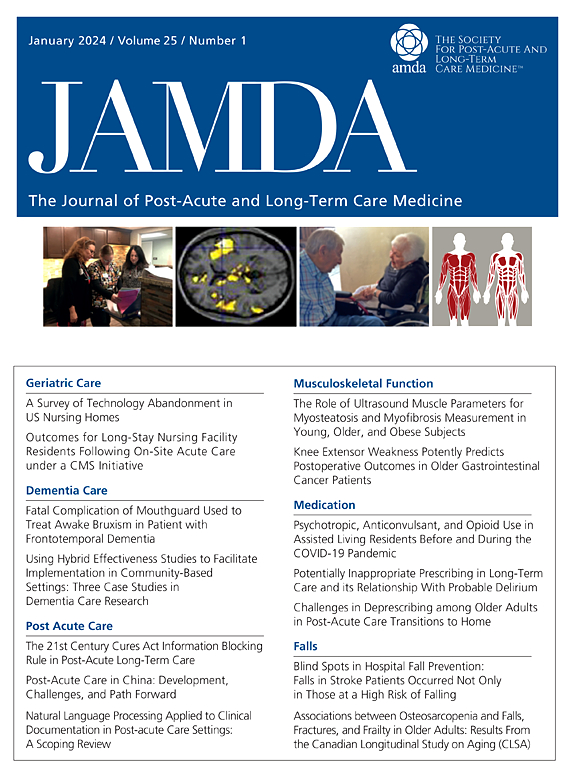Influence of the COVID-19 Pandemic on Influenza and SARS-CoV-2 Vaccination Willingness Among Dutch Nursing Home Health Care Workers
IF 4.2
2区 医学
Q2 GERIATRICS & GERONTOLOGY
Journal of the American Medical Directors Association
Pub Date : 2025-02-01
DOI:10.1016/j.jamda.2024.105420
引用次数: 0
Abstract
Objectives
To explore the influenza and COVID-19 vaccination status among Dutch nursing home (NH) health care workers (HCWs), factors associated with vaccination including the influence of the pandemic, and the facilitators and barriers to vaccination willingness.
Design
An explanatory sequential mixed methods study.
Setting and Participants
HCWs providing direct care to residents in Dutch NHs.
Methods
An online questionnaire (September 2022) assessed vaccination status, barriers to vaccination, and the influence of the pandemic on influenza vaccination willingness. Facilitators and barriers to vaccination willingness were identified in 10 semistructured interviews and 1 focus group (February and September 2023).
Results
A total of 298 HCWs completed the questionnaire (87.5% women, 43.5% aged > 50 years). Nearly all HCWs (94.0%) received the primary COVID-19 vaccination(s). Influenza vaccination coverage was 41.7% prepandemic, 56.4% in 2021-2022, and 54.7% of the HCWs intended to receive an influenza vaccination in 2022-2023. Perceived urgency was identified as an important reason for the increased influenza vaccination coverage during the pandemic and for the difference between COVID-19 and influenza vaccination willingness. We identified knowledge gaps and (dis-)beliefs regarding vaccine efficacy, the role of preventive measures, and the role of the own immune system. Facilitators to vaccination willingness included addressing practical issues (eg, flexible scheduling, on-site vaccine provision).
Conclusions and Implications
The influence of the pandemic on influenza vaccination willingness among Dutch NH HCWs appears to be temporary, underscoring the importance of addressing practical barriers to vaccine access. Concerns about the added value of vaccinations relative to trust in one's immune system or health and other preventive measures should be addressed in strategies aimed at optimizing vaccination uptake. To achieve this, a foundation of trust must first be created by neutral and factual communication and education.
COVID-19大流行对荷兰养老院医护人员流感和SARS-CoV-2疫苗接种意愿的影响
目的:了解荷兰养老院(NH)卫生保健工作者(HCWs)的流感和COVID-19疫苗接种情况、与疫苗接种相关的因素(包括大流行的影响)以及疫苗接种意愿的促进因素和障碍因素。设计:解释性顺序混合方法研究。环境和参与者:卫生保健工作者为荷兰国民保健制度的居民提供直接护理。方法:通过在线问卷(2022年9月)评估疫苗接种状况、疫苗接种障碍以及流感大流行对流感疫苗接种意愿的影响。在10次半结构化访谈和1个焦点小组(2023年2月和9月)中确定了疫苗接种意愿的促进因素和障碍。结果:共298名卫生保健员完成问卷调查,其中87.5%为女性,43.5%为50岁以下卫生保健员。几乎所有卫生保健工作者(94.0%)都接种了首次COVID-19疫苗。流感疫苗接种率在大流行前为41.7%,2021-2022年为56.4%,计划在2022-2023年接种流感疫苗的卫生保健工作者为54.7%。认为紧迫性是流感大流行期间流感疫苗接种覆盖率增加以及COVID-19与流感疫苗接种意愿之间存在差异的重要原因。我们确定了关于疫苗功效、预防措施的作用和自身免疫系统的作用的知识差距和(错误)信念。促进疫苗接种意愿的因素包括解决实际问题(例如,灵活安排时间、现场提供疫苗)。结论和影响:流感大流行对荷兰卫生部卫生保健员接种流感疫苗意愿的影响似乎是暂时的,这突出了解决疫苗获取实际障碍的重要性。应在旨在优化疫苗接种率的战略中解决有关疫苗接种相对于对个人免疫系统或健康的信任或其他预防措施的附加价值的问题。要做到这一点,首先必须通过中立和实事求是的交流和教育来建立信任的基础。
本文章由计算机程序翻译,如有差异,请以英文原文为准。
求助全文
约1分钟内获得全文
求助全文
来源期刊
CiteScore
11.10
自引率
6.60%
发文量
472
审稿时长
44 days
期刊介绍:
JAMDA, the official journal of AMDA - The Society for Post-Acute and Long-Term Care Medicine, is a leading peer-reviewed publication that offers practical information and research geared towards healthcare professionals in the post-acute and long-term care fields. It is also a valuable resource for policy-makers, organizational leaders, educators, and advocates.
The journal provides essential information for various healthcare professionals such as medical directors, attending physicians, nurses, consultant pharmacists, geriatric psychiatrists, nurse practitioners, physician assistants, physical and occupational therapists, social workers, and others involved in providing, overseeing, and promoting quality

 求助内容:
求助内容: 应助结果提醒方式:
应助结果提醒方式:


